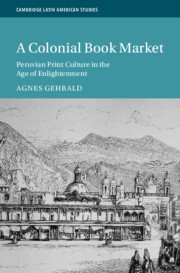
- Publisher:
- Cambridge University Press
- Online publication date:
- November 2023
- Print publication year:
- 2023
- Online ISBN:
- 9781009360876

This volume provides a wholly original social history of books in late colonial Peru. From the second half of the eighteenth century onward, workshops in Lima and transoceanic imports supplied the market with unprecedented quantities of print publications. By tracing the variety of printed commodities that were circulating in the urban sphere, as well as analysing the spatiality of the trade and the materiality of the books themselves, Agnes Gehbald assesses the meaning of print culture in the everyday lives of the viceroyalty. She reveals how books permeated late colonial society on a broad scale and how they figured as objects in the inventories of diverse individuals, both women and men, who, in previous centuries, had been far less likely to possess them. Deeply researched and profound, A Colonial Book Market uncovers how people in Peruvian cities gained access to reading material and participated in the global Enlightenment project.
‘It is not the ideas of books that matter here, but themselves, as objects of trade, as things that can be exchanged or even stolen. Tracing the diversity and reach of Peruvian print culture in the age of Enlightenment, Gehbald creates a fascinating narrative of book consumption throughout the viceroyalty and across the Atlantic.’
Natalia Majluf - author of Inventing Indigenism: Francisco Laso’s Image of Modern Peru
‘In this lively and well-researched study, Agnes Gehbald shows how the residents of this Spanish viceregal capital city produced, imported, sold, and consumed books with greater zeal than ever in the late colonial period. A Colonial Book Market is a welcome contribution to our understanding of Latin America, literacy, material culture, and the Enlightenment.’
Bianca Premo - author of The Enlightenment on Trial: Ordinary Litigants and Colonialism in the Spanish Empire
‘Agnes Gehbald’s detailed analysis of the trade of books from foreign workshops, the operation of local workshops, of second-hand markets and everyday circuits of printed materials in busy urban centers, shows the deep transformation of Peruvian literary and semi-literary social practices at the end of the eighteenth century. A comprehensive and fascinating ‘new’ history of the book.’
Cristina Soriano - author of Tides of Revolution: Information, Insurgencies, and the Crisis of Colonial Rule in Venezuela
‘Agnes Gehbald’s study reveals that despite a variety of legal and material constraints, diverse print markets flourished in the eighteenth century, aligning Peru with broader trends in Europe and the Americas. By exploring the practical dimensions of production, circulation, and use, Gehbald weaves books in all their forms - from erudite histories and how-to manuals to devotional texts, popular almanacs, instructional cartillas and prohibited works - into the fabric of everyday life.’
Corinna Zeltsman - author of Ink Under the Fingernails: Printing Politics in Nineteenth Century Mexico
‘A refreshingly original portrayal of the Enlightenment in Peru.’
Martin Bowen Source: Eighteenth–Nineteenth Centuries
‘Throughout, Gehbald is to be applauded on her extensive archival research which, among other things, provides evidence of the diversity of the colonial book market and its consumers.’
Emily C. Floyd Source: Journal of Latin American Studies
‘With careful and agile prose, the author analyzes in considerable detail the distribution and consumption of … printed matter … This is a study based on an extensive documentary and bibliographic corpus. Gehbald’s study … proposes new and interesting research perspectives in the colonial readership, a fascinating field of study.’
Pedro M. Guibovich Pérez
‘Gehbald skillfully weaves together diverse aspects of Peruvian print culture … In order to peel back the many layers involved in the long journey from print to circulation to acquisition, she furthermore makes use of a wide range of archival sources, such as stock inventories of ships and shops, wills and probate inventories, bankruptcy proceedings, and inquisitorial records, to name just a few. Gehbald unearths a wealth of materials and data, and she mines it well.’
María Soledad Barbón Source: Dieciocho
 Loading metrics...
Loading metrics...
* Views captured on Cambridge Core between #date#. This data will be updated every 24 hours.
Usage data cannot currently be displayed.